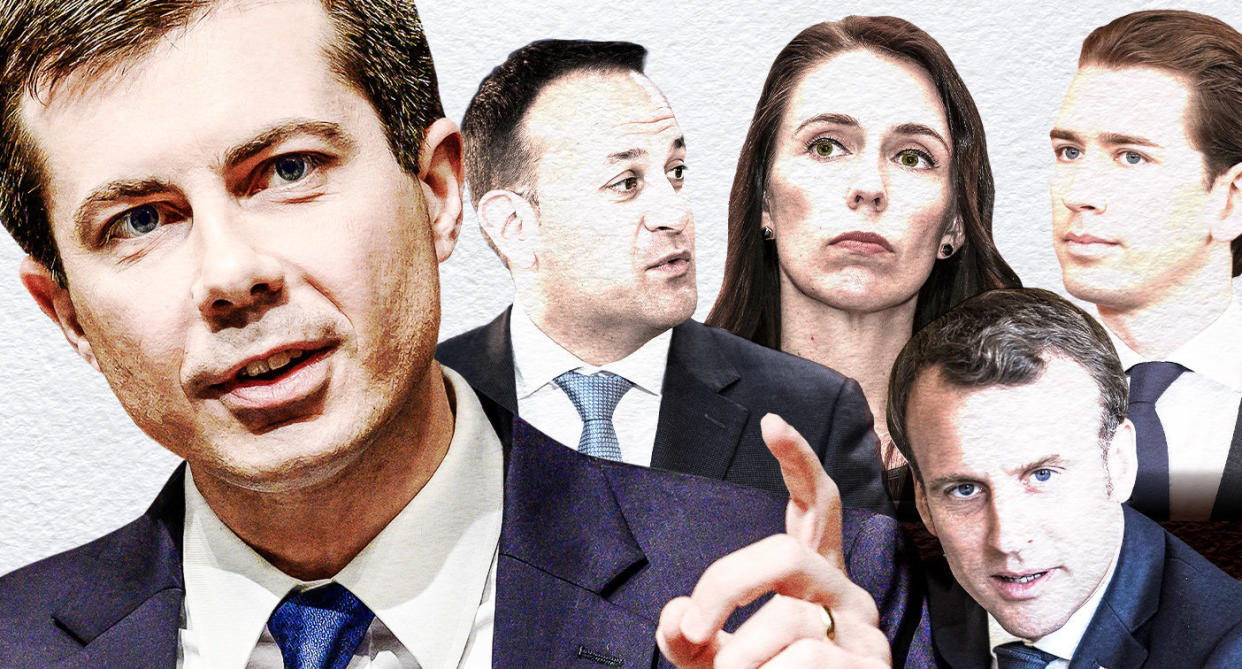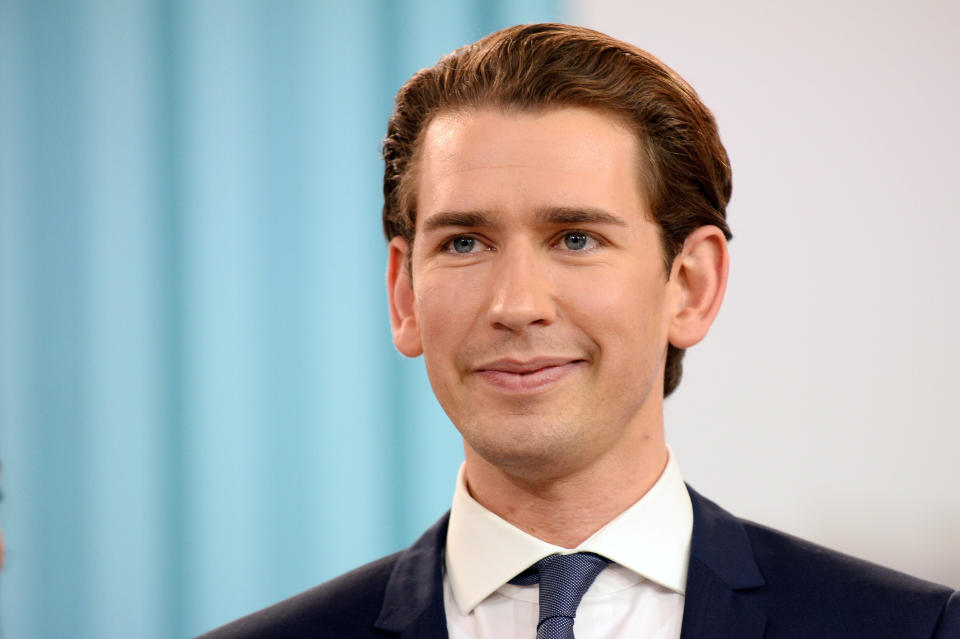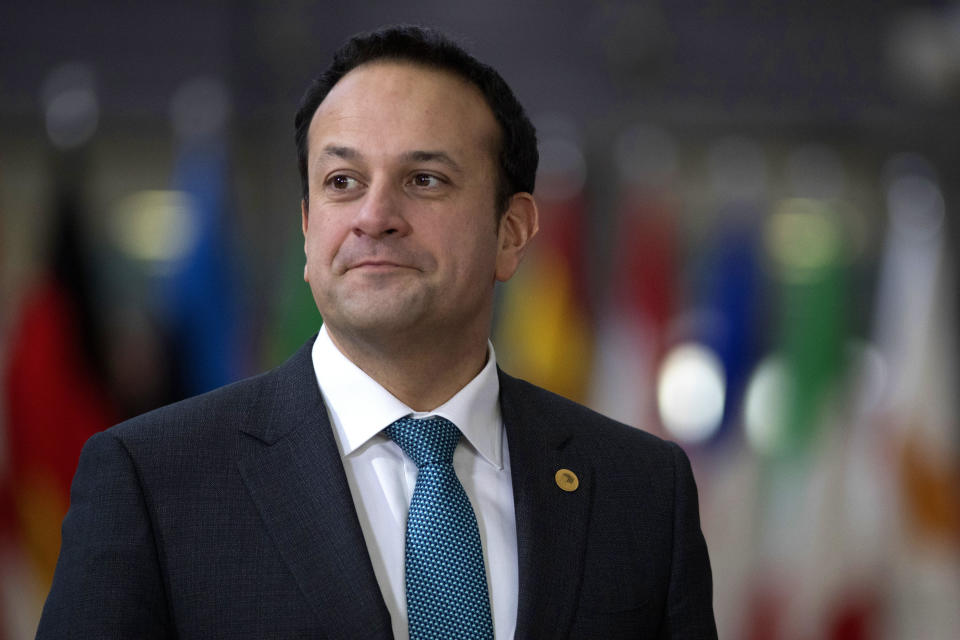Buttigieg's ascent shows millennial revolution spreading to U.S.

In case you’ve missed it, the “hottest [2020 presidential] candidate in the land” is really, really young (for a presidential candidate).
His name is Pete Buttigieg. Buttigieg is the Democratic mayor of South Bend, Ind. He was 29 when he won that office in 2012. Now he’s 37. That is less than half the age of the two Democratic frontrunners, Joe Biden (76) and Bernie Sanders (77).
On Sunday, Buttigieg will return home to officially declare his candidacy after months of testing the waters. If elected, he would become, at 39, the youngest president in U.S. history.
Buttigieg has a long way to go before displacing President Trump in the Oval Office. He currently lingers at 2.9 percent in the polls, good for seventh place among Democratic primary candidates. Roughly two-thirds of Democrats surveyed by Morning Consult have no opinion of him. Half haven’t even heard of him. Meanwhile, those who have heard of Buttigieg probably know more about his platinum résumé — Harvard grad, Rhodes scholar, Afghanistan vet, McKinsey consultant, openly gay Episcopalian — than they do about his policies.
Yet over the past month or so, Buttigieg has hands-down won the “most improved” award among Democratic candidates. In the polls, he has escaped also-ran anonymity and emerged as a real if modest force, besting bigger names such as Cory Booker, Kirsten Gillibrand and Amy Klobuchar nationally and in Iowa, where more than one survey shows him ahead of Kamala Harris and Beto O’Rourke as well. In New Hampshire, the latest polling puts him in third place behind Biden and Sanders, with a 33 percent leap in name ID since February. During the first quarter of 2019, the mayor raised $7 million — more than Elizabeth Warren. And he was name-checked a total of 216 times on Fox News, MSNBC and CNN between March 31 and April 6 — a period during which the only candidates who got more mentions were Sanders (551) and O’Rourke (300), according to FiveThirtyEight.
As Slate recently put it, “Last month, Mayor Pete was having a moment; this month, it looks like he has an actual chance.”

Buttigieg’s rapid ascent may seem sui generis. But the truth is, he’s not alone. Just before a growing contingent of Democrats started swooning over this out-of-the-blue millennial contender, four other first-world countries elected improbable 30-something leaders of their own.
New Zealand Prime Minister Jacinda Ardern is an amateur DJ who has called capitalism “a blatant failure” and made international waves for taking six weeks of maternity leave and later launching a successful effort to ban assault weapons days after the country’s deadliest mass shooting. She was 37 when she took office.
Ireland’s Taoiseach Leo Varadkar is the openly gay son of an Indian immigrant who trained as a doctor before seizing the reins of his country’s center-right Fine Gael party — and a key role in the U.K.’s endless Brexit drama. He was 38 when he took office.
French President Emmanuel Macron is a former investment banker who in 2017 broke with his Socialist Party roots, launched his own “movement,” En Marche!, and gained control of both élysée Palace and parliament. He was 39 when he took office.
And Austrian Chancellor Sebastian Kurz is a wunderkind pol who rode to power by adopting restrictive immigration policies and allying with his country’s right-wing populist Freedom Party, which was founded by former Nazis. He was 31 when he took office.
Could the United States could be the next country to join the under-40 club? And if so, what can Ardern, Varadkar, Macron and Kurz tell us about the future of American politics?

“A lot of countries have been electing 39-year-olds lately,” Buttigieg noted in January when Yahoo News’ Alexander Nazaryan asked if he felt prepared for the presidency. “Change has always come from young people. Changes we like, changes we don’t like: the civil rights movement, the Iranian revolution. It’s always young people at the tip of the spear. I don’t think it will be different this time.”
The mayor’s response raises an intriguing question.
What if the sudden rise of millennial world leaders, coupled with Buttigieg’s own rise at roughly the same time, represents something more than mere coincidence?
What if instead it reflects how these next-generation politicians approach leadership differently than their predecessors — and how that approach may be starting to resonate?
Any exercise in generational essentialism — any attempt to say “all millennials are like this” or “all younger leaders are like that” — is foolish, especially when you’re talking about figures as dissimilar as Ardern, Varadkar, Macron and Kurz. But look closely at their paths to power and styles of persuasion and a few common threads stand out.
The first is that all of them tend to question basic assumptions. Beyond her remarks about capitalism, Ardern remains unapologetically unmarried to her long-term partner, celebrity TV fisherman Clarke Gayford, and she did not hesitate to take six weeks of maternity leave during her first year in office. “It’s not our normal yet,” she said at the time. “But one day it will be.” After a white supremacist shot and killed 50 Muslims in Christchurch in March, Ardern donned a hijab and refused to utter his name, resisting revenge-based “war rhetoric,” as the New Yorker’s Masha Gessen put it, and “quietly upend[ing] every expectation about the way Western states and their leaders respond to terrorist attacks.”

It’s almost as if it’s easier for younger leaders, formed by fresher forces than their predecessors, to see conventional wisdom for what it is — merely conventional, and not necessarily all that wise. When Macron abandoned France’s existing party structure and the ideological extremes it embodied; when Kurz contained the far right by coopting some of its positions, upsetting much of the rest of Europe; when Varadkar, at that time the minister for health, came out in the midst of Ireland’s referendum on legalizing same-sex marriage — “a political risk in a country where being gay was illegal until 1993,” according to Time — each was making the kind of outside-the-box moves that might not have occurred to more senior politicians.
“The traditional divide between left and right, capital and labor, small state and big state, high taxes and low taxes doesn’t define politics in the way it did in the past,” Varadkar has said. “We see new divisions emerging.”
This instinct to disregard convention often leads, in turn, to policy decisions that might have been considered not just unconventional but downright radical only a few years ago. Macron, for instance, has been “hell-bent on breaking old rules in France,” reports the Daily Beast’s Christopher Dickey, “ramming through changes to the labor code” and “pushing through changes to France’s often chaotic and self-contradictory immigration laws.” Likewise, Kurz’s government has “pushed tougher controls on immigration, a crackdown on benefits for foreigners, action against ‘parallel societies,’ including a ban on girls wearing headscarves in kindergarten, and the closure of mosques accused of abusing laws prohibiting the foreign financing of religious communities,” according to the Financial Times.
But again, Arden may provide the most striking example. In the immediate aftermath of the Christchurch shooting, observers were struck by how swiftly the prime minister pivoted from grieving with the families of victims to insisting on stricter regulation. “I can tell you one thing right now,” Ardern said the day after the attack. “Our gun laws will change.” Six weeks later, New Zealand passed a law banning most semiautomatic weapons — a measure that had failed after previous mass shootings but now earned the support of all but one of Parliament’s 120 lawmakers.
“New Zealand stands apart in its widespread availability of weapons of such destructive nature and force,” Arden said. “Today that anomaly ends.”
The final and perhaps most distinctive ingredient the global millennial leadership mix, however, is the way Ardern, Varadkar, Macron and Kurz have all branded themselves as utterly mainstream, despite their obvious unconventionality. Through style and rhetoric, they endeavor to make even radical shifts seem common-sensical — unlike, say, fellow millennial Alexandria Ocasio-Cortez, who wears “radical” as a badge of honor.

Kurz may believe in harder borders and a stronger national identity, for instance, but he also believes in the European Union, unlike the reactionary populists currently threatening the cohesion of the continent. “Kurz couldn’t have seemed further from the Trumpian stereotype,” Time reported in 2018. “He is cordial. He is modest. He listens.” Ardern speaks frequently of “empathy” and “kindness”; Macron describes himself as a beacon of the “radical center,” and “the buzzwords among his advisors are ‘efficiency,’ ‘pragmatism,’ and ‘results,’” according to Dickey.
Buttigieg fits this mold. As New York Times columnist David Brooks put it in a widely read April 1 column headlined “Why You Love Pete Buttigieg,” “Buttigieg’s secret is that he transcends many of the tensions that run through our society in a way that makes people on all sides feel comfortable.” Brooks went on:
He is young and represents the rising generation, but he is also an older person’s idea of what a young person should be. … He doesn’t sound like an angry revolutionary. … He squares a lot of circles. He eschews grand ideological conflict [and] deftly detaches progressive policy positions from the culture war. He offers change without Sturm und Drang.
The full transcript of the mayor’s January interview with Yahoo News, which ran only in excerpts at the time, neatly illustrates the approach that Buttigieg shares with his foreign counterparts. In one previously unpublished exchange, Yahoo’s Alexander Nazaryan asks Buttigieg whether his leadership style differs from Hillary Clinton’s, given that both might be described as “pragmatic.”
“That’s what I think people are missing in this debate between the left and the center,” Buttigieg says. “Pragmatism is not the same thing as incrementalism. Politically speaking, one thing that was demonstrated by Trump, and to a lesser extent Sanders, is that appealing to independents, which is super important, has relatively little to do with ideological centrism. In the 1990s framework, the insight [Democrats] had to appeal to independents was the insight we had to be ideological centrists. They were the same thing. Today that’s not true. In 2016, a lot of people had it narrowed down to Bernie or Trump.”

Buttigieg goes on to explain that pragmatism and centrist incrementalism don’t just differ politically. The distinction is also substantive.
“It turns out that when you follow facts where they lead, it often takes you to places that are fairly radical,” he says. “Think about the structural problems in our democracy. I would argue that it’s pragmatic to point out that the U.S. has the wrong number of states and we should totally get rid of the electoral college. To me that’s pragmatic — even if it requires a constitutional amendment, which makes it bold.
“Or take Medicare for All,” Buttigieg continues. “What’s not pragmatic about that? Maybe we can get there, maybe we can’t. But it’s nothing if not pragmatic to suggest that we should go with the model that seems to work for most of the industrialized world. You could argue that it’s less pragmatic to propose that we continue with this Rube Goldberg machine we have now. So in that case the centrist solution is not the pragmatic solution.”
But how do you communicate this kind of subtle distinction in such a crowded, overheated primary? Nazaryan wonders.
“Certainly you can command attention by figuring out who can call Trump the best name today,” Buttigieg says. “But that’s exhausting, and that style exhausts itself. So what I think you do is you express your proposal in terms that help whoever is sitting at home see what it means to them differently. And I think good policies, especially quote-unquote radical policies that a pragmatic approach would lead you to, will have the quality of being relatively easy to explain in those terms.”
Like what?
“Like the idea of a Manhattan Project for energy.”
A Green New Deal?
“Sure. The point is … we always explain this in terms of the research — like, the money that goes to researchers to do what they’re doing. But what most people want to know is, “How is that different for my life?” So what if we said, ‘Over the next 10 years … Uncle Sam is going to mail you a solar panel. We’re going to free you from paying an electric bill.’ That way it’s less about ‘How are we going to make America energy independent?’ — which is kind of abstract — and more about ‘How are we going to make you and your family energy independent?’ Both messages address the same goal. But one of them is much more obvious in terms of ‘what it means to me.’”
“That’s the language that we need to recover,” Buttigieg concludes. “If we’re good at that, it just might cut through. Everybody else is going to sound like everybody else. It will be the idiom of cable. It will be idiom of Congress. And it’s not the idiom of where I live.”

Over the intervening months, Buttigieg’s M.O. — his assumption-questioning, radical-yet-rational millennial style — has led him to some pretty interesting places politically.
“I think we’re in a tectonic shift in America such that even now we may be underreacting to how deep this moment is. I mean, you have basically a 30- or 40-year-long Reagan consensus that that held sway over this country… and that’s done,” Buttigieg said earlier this month. “I think it’s a moment that’s really crying out for big ideas, and for us to pay attention to just really profound things happening.”
And so Buttigieg was one of the first Democrats to discuss changing the composition of the Supreme Court — not by packing the bench with sympathetic justices but rather by expanding it to include five Democratic picks, five Republican picks and five additional justices agreed upon by all 10 partisan appointees. He was one of the first Democrats to say that ending the legislative filibuster “has got to be on the table.” A devout Episcopalian, he is also the only Democrat talking about his Christian values and how they point him toward “protecting the sick and the stranger and the poor, as well as skepticism of the wealthy and the powerful and the established.”
As a result, Buttigieg “feels to a lot of Democrats like a different kind of candidate: neither a poll-tested milquetoast centrist nor a part of an entrenched party faction, but a competent executive whose vision directly addresses their Trump-era anxieties and partisan anger,” Vox’s Zach Beauchamp recently wrote. At the same time, “a number of conservatives have shown a growing interest in Buttigieg and at times offered positive remarks about the Democratic presidential candidate,” notes Politico. Even talk show host Rush Limbaugh said that he saw “no radicalism” in the “personable” candidate, whom he predicted would “make mincemeat” out of his Democratic debate opponents.
This, of course, is much the same tightrope that Buttigieg’s fellow 30-somethings overseas walked to get to their own countries’ highest offices: How to make a major break with the past feel mainstream? Whether Buttigieg can keep his balance in the coming months remains to be seen; he has a very long way to go. But the lesson from abroad is that if Buttigieg does somehow manage to follow in the footsteps of Ardern, Varadkar, Macron and Kurz next November, he won’t have won in spite of his age. He will have won because of it.
Alexander Nazaryan contributed to this story
_____
Read more from Yahoo News:


